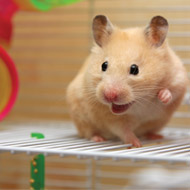Hamsters happiest in hammocks, study finds

Hamsters housed in cages with ledges, hammocks, chews and extra bedding are more optimistic.
Hamsters living in cages enriched with hammocks, extra bedding, ledges and chews are more positive than than those living in less luxurious cages, according to a study by Liverpool John Moores University (LJMU).
The study, published in Royal Society journal Open Science, reveals that enriched hamsters make more optimistic judgements about ambiguous information than they do when enrichment is removed.
Scientists tested the happiness of hamsters by training the creatures to choose between bitter-tasting water laced with quinine and sugar water placed in another location. The hamsters were quick to approach the sugar water, but stopped approaching the bitter water.
Half of the hamsters were then given a range of enrichment devices, including extra bedding hammocks, chews and ledges, to increase opportunities to express natural behaviours and improve their mood. The scientists then measured how often hamsters approached 'ambiguous' drinkers placed in locations in between the sweet and bitter water locations. The enriched hamsters approached the ambiguous drinkers more often than the unenriched hamsters did, suggesting that they were more optimistic that the drinkers might contain sugar water.
Commenting on the study, Dr Emily Bethell senior lecturer in primate behaviour, said: “This study shows that hamsters housed in enriched environments make more optimistic judgements about otherwise ambiguous information.
"The important note for pet owners is that ensuring pets have adequate opportunities to express natural behaviours in captivity improves their mood and is essential for their welfare."
Co-author Dr Nicola Koyama, adds: “Judgement bias studies let us examine the effect of emotions on cognitive processes and are important measures for improving animal welfare.
"Hamsters are often a child’s first pet and we’ve shown that what goes into a cage (ledges, chews, hammocks and material to dig in) has a positive impact on a hamster’s emotional state and thus, their well-being.”
The study is the first of its kind to demonstrate that positive shifts in emotion can be objectively measured in hamsters.



 The Veterinary Medicines Directorate (VMD) is inviting applications from veterinary students to attend a one-week extramural studies (EMS) placement in July 2026.
The Veterinary Medicines Directorate (VMD) is inviting applications from veterinary students to attend a one-week extramural studies (EMS) placement in July 2026.